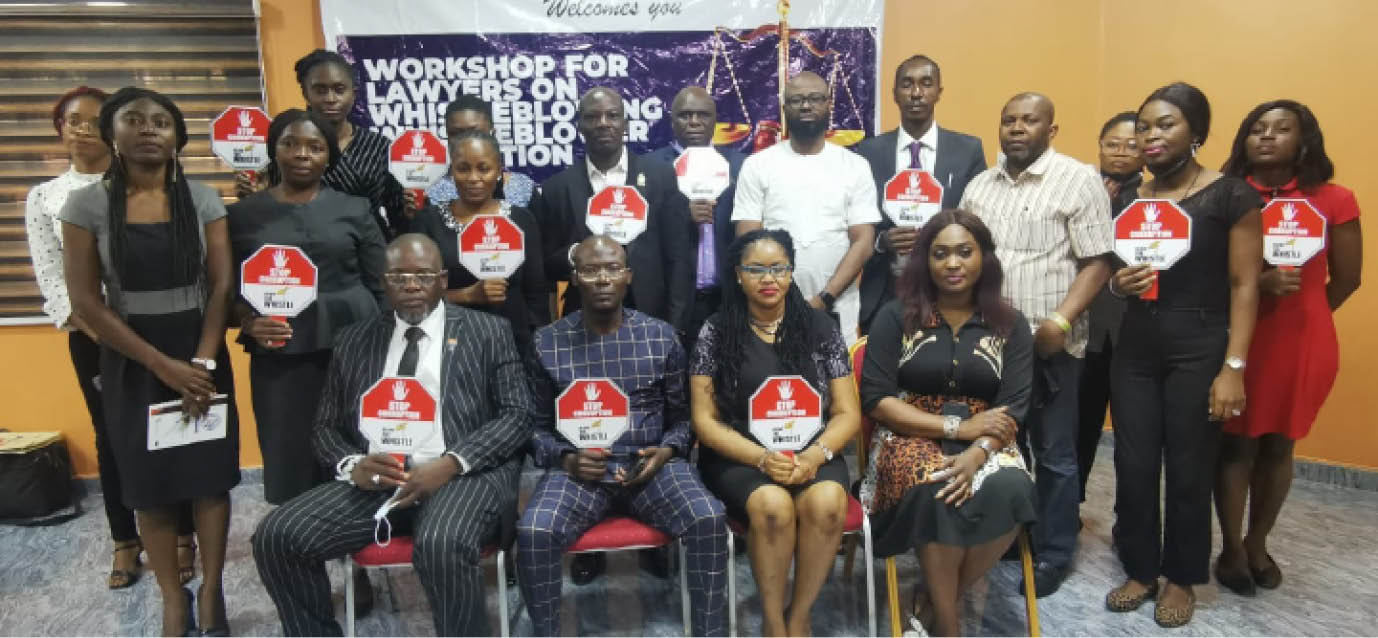The federal government’s whistleblower policy of 2016 may have gone cold, but Civil Society Organisations (CSOs) are working to keep it alive by protecting individuals who wish to blow the whistle on corruption.
CSOs such as the African Centre for Media and Information Literacy (AFRICMIL) and the Socio-Economic Rights and Accountability Project (SERAP) believe the practice is important to curb the high rate of corruption in Nigeria. Thus, they organised a training for lawyers to offer pro bono (free) services for victimised whistleblowers in both the public and private sectors.
- CJN moves to end ‘forum shopping’ as lawyers worry over conflicting judgments
- 50 federal workers for Oxford leadership programme
The training, which is supported by The John D. and Catherine T. MacArthur Foundation is part of AFRICMIL’s project tagged: “Corruption Anonymous (CORA)”.
The International Labour Organisation (ILO) defines whistleblowing as “the reporting by employees or former employees, of illegal, irregular, dangerous or unethical practices by employers”.
The Coordinator of AFRICMIL, Chido Onumah, explained that it engaged the CORA project on three major planks: creating awareness and sensitising the public on the importance of whistleblowing as a tool for fighting corruption and checking other forms of wrongdoing in society; advocating honest implementation of the policy; and ensuring effective protection for people who are courageous enough to blow the whistle.
Onumah further said, “However, of late, following the renewal of the project for another three years, we have added a fourth platform of engagement with the sole objective of working for the institutionalisation of whistleblowing as a vital mechanism for transparency and democratic good governance in Nigeria.
“In a bid to ensure a successful implementation of the CORA project, AFRICMIL has built strategic alliances with relevant stakeholders like the Presidential Initiative on Continuous Audit (PICA) — a unit in the Federal Ministry of Finance, Budget and National Planning — that is charged with the responsibility of managing the whistleblowing policy, anti-corruption agencies, CSOs, a coalition of public interest lawyers and the media.”
He explained that the centre painstakingly identified and invited as partners for the project, lawyers who were in human rights, commercial and criminal law practice, bearing in mind the intricacies and pervasiveness of corruption in all facets of life.
The convener of Criminal Justice Network of Nigeria, Mr Nathaniel Ngwu, who spoke on the “Role of Lawyers and Civic Partners” at the training said the essence of whistleblowing was to improve compliance to the rule of law, combat corruption, safeguard integrity, enhance democratic accountability, support economic progress, promote human rights, as well as to improve public institutional governance.
He stressed the need for lawyers to get involved in the advocacy, understand when an issue was raised, study the facts and relate them to the policy and provisions of the law; maintaining that individuals who wanted to raise alarm against corrupt practices in Nigeria should partner with the body of lawyers or network of lawyers.
Also, he encouraged the lawyers to monitor the investigation processes and partner with government agencies to evaluate and document all necessary facts/evidences that could grant conviction.
He stressed that, “There is no how a whistleblower will suffer if the lawyer has been part and parcel of the matter from the initial stage to the end.”
He, also stressed the need for a law to protect whistleblowers as a matter of urgency and encouraged states to come up with same law or domesticate the Whistleblowers Protection Act.
The Deputy Director of SERAP, Kolawole Oluwadare, called on anyone with authentic information about violation, misconduct or improper activity which could impact negatively on the society to report through SMS, email and a dedicated portal.
In his presentation titled: “The Inadequacy of Legislation on Whistleblower Protection in Nigeria: International Laws and International Good Practices to the Rescue”, Oluwadare described a whistleblower as a person who exposesinformation or activity within a private, public or government organisation that was deemed illegal, illicit, unsafe, or a waste, fraud or abuse of taxpayers’ funds.
On reward, he disclosed that the whistleblower would get between five and 25 per cent of the recovered loot provided that “there is a voluntary return of stolen or concealed public funds or assets on the account of the information provided.”
He noted that people who felt badly treated could file a formal complaint as earlier stressed by Vice President Yemi Osinbajo at the National Conference on Whistleblower Policy in September, 2020.
Mr Kola Ogunbiyi of AFRICMIL, however, clarified that CSOs could not take the place of lawyers, noting that a civil society person could not ordinarily appear in court to defend a victimised whistleblower.
The role of the civil society, according to Ogunbiyi, is to expose wrong doings and to sensitise the public on the role of citizens; either to protect whistleblowers or protect corrupt practices.
He said, “When the policy was made in 2016, there was so much awareness probably because they were not getting results; those who blew the whistle probably weren’t compensated, and as such, a lot of people lost interest in the whistleblowing policy.”
He stressed that until there was a law that guaranteed protection for whistleblowers, the tempo might remain very low because everyone cared for their life.
He, therefore, appealed to the National Assembly to pass the Whistleblower Protection Bill before it.
Christiana T. Alabi & Sheyifunmi Salami, Lagos

 Join Daily Trust WhatsApp Community For Quick Access To News and Happenings Around You.
Join Daily Trust WhatsApp Community For Quick Access To News and Happenings Around You.


